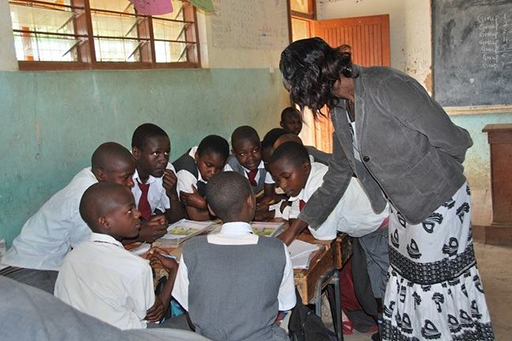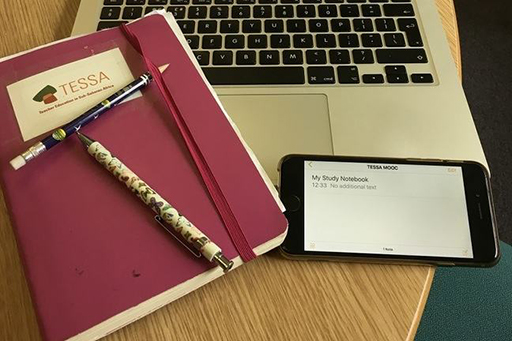Use 'Print preview' to check the number of pages and printer settings.
Print functionality varies between browsers.
Printable page generated Friday, 26 April 2024, 3:29 AM
Getting started
Welcome
Welcome to the Making teacher education relevant for 21st century Africa course.
This task-oriented badged open course was designed for teacher educators as a part of the TESSA Open Educational Resources (OER), and was successfully presented in 2018 as a MOOC (massive open online course), winning ‘Digital Innovation of the Year – Learning’ in the PIEoneer Awards 2018. It is now presented in a slightly different way so that you can work through the material at your own pace. Although there is an emphasis on the African context and the TESSA OER, educators from other parts of the world may also find this course useful.
The course is in four sections that will take three to four hours of study. It focuses on the following contemporary issues in teacher education:
- developing active approaches to teaching and learning
- using ICT to support classroom teaching
- selecting, evaluating and using OER to help support quality in teacher education.
You can study the course as an individual, although we recommend that you study with colleagues in your setting as the activities are designed to promote discussion. You may be working in a university, teachers’ college, local resource centre or other teacher-education setting, or as a headteacher or other senior member of staff supporting the teachers in your school.
You may want to act as a facilitator for a group of colleagues working together. We have provided a facilitator guide to help you in this role. Activities marked with the ‘facilitators’ icon (![]() ) are good ones to facilitate. Whatever your circumstance, we hope that you will find ideas and OER that you can use to improve classroom teaching and learning.
) are good ones to facilitate. Whatever your circumstance, we hope that you will find ideas and OER that you can use to improve classroom teaching and learning.
We are asking participants to complete the pre-course survey to help us understand who is taking part in the course, their motivations and expectations. Thank you for completing this. Your experience and opinions are important to us.
Kris Stutchbury, Academic Director
Course assessment

This course gives you the opportunity to earn a free certificate with a digital badge as a recognition of your learning. To qualify for your certificate and badge, you need to complete the whole course and score at least 50% in the quizzes.
These quizzes constitute the bulk of the assessment for the course. Their purpose is to:
- enable you to measure what you have learned
- provide feedback on your progress
- summarise learning points
- contribute to earning your badge and certificate.
There is one assessment activity per section, three of them are quizzes:
- Activity 1.9: Reviewing your learning in a quiz on Section 1.
- Activity 2.2: Completing a ‘true or false’ quiz on learner-centred education.
- Activity 3.6: Sharing your ideas on how to integrate ICT into learning.
- Activity 4.7: Checking your understanding in a quiz that covers the whole course.
The quizzes contribute to your learning and will give you feedback on each question. Take note of this feedback, as you will be given the opportunity to retake the quizzes.
Remember to read the instructions at the beginning of each assessment activity to clarify what you’re being asked to do.
Study notebook

We recommend that you keep a study notebook (learning journal) for this course to support your professional development. You may have kept one before or the idea may be new to you. Essentially, this is a notebook in which you note such things as:
- ideas that may come to you when you are either studying or in the workplace, or at any other time
- notes about articles that you read as you go along
- reflections on your own learning as you move through the course.
The last item here – reflection on your own learning – is one of the most important. It is helpful to identify how your own personal theories, ideas and beliefs change, or are reinforced, by your study.
Sometimes this learning will be very clear to you; at other times, your learning will only become apparent over a much longer timespan – for example, when you introduce some ideas into your place of work or draw on some of your practice in your learning.
Your study notebook is personal to you and it should be useful to you. You may want to share parts of it with a friend or colleague. There is no set formula for keeping a study notebook: some days you may write a great deal; at other times only a little. However, you are advised to write notes in such a way that you can understand them when you return to them months later. Throughout the course you will be prompted to note down a response in your study notebook.
You can keep your notebook in a format that appeals to you and is easy for you to maintain – it could be an ordinary paper notebook or on a desktop or mobile device.
Meet the authors
Kris Stutchbury is a Senior Lecturer in Teacher Education and Development at The Open University, UK, and is the Academic Director of TESSA.
Clare Woodward is a Lecturer in Education and Development at The Open University, UK.
Liz Chamberlain is a Senior Lecturer in Education at The Open University, UK, and Programme Leader for Primary Education Studies.
Sandra Amos was a Lecturer in Education at The Open University, UK, and contributed to the development of the MOOC.
You should now start on Section 1 of the course.